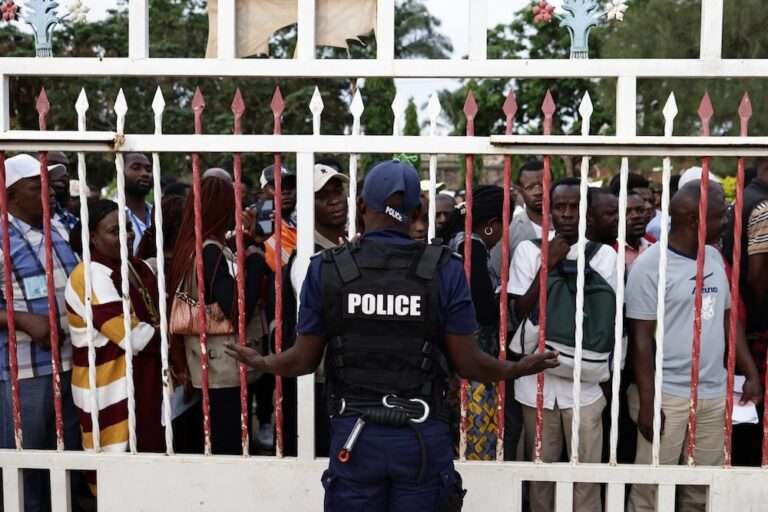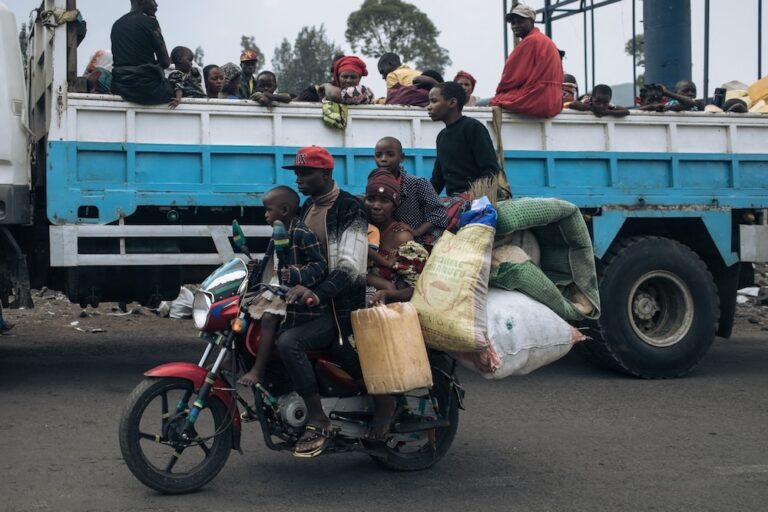(JED/IFEX) – The following is an abridged version of a 5 September 2006 JED open letter to William Lacy Swing, special representative of the UN secretary general in DR Congo: Ambassador William Lacy Swing Special Representative of the UN Secretary General in DR Congo Kinshasa/Gombe There is still time to stop state violence against media […]
(JED/IFEX) – The following is an abridged version of a 5 September 2006 JED open letter to William Lacy Swing, special representative of the UN secretary general in DR Congo:
Ambassador William Lacy Swing
Special Representative of the UN Secretary General in DR Congo
Kinshasa/Gombe
There is still time to stop state violence against media
Journaliste en danger (JED), an independent and non-partisan organization for the defense and promotion of press freedom, based in DR Congo, and the Alerts Network of the Central African Media Organization (OMAC), has written to let you know about its strong fears regarding the very tense situation created and maintained around certain media outlets in the DR Congo since the 20 August 2006 publication of provisional results in the presidential election.
[. . .]
Today, a few weeks before the second round of the presidential election, JED has noted that under diverse pretences, the current government’s security services have increased threats against the media with the undisclosed objective of preventing all contradictions, reducing to silence any discordant voices and filtering the information the public receives.
For instance, the day after the proclamation of provisional results in the first round of presidential elections, armed clashes broke out between the guards of the outgoing head of state, Joseph Kabila, and those of his challenger in the second round, Jean-Pierre Bemba, in the streets of Kinshasa. Also, all radio and television channels privately-owned by Bemba (CCTV, CKTV, and RALIK) have been shut down by cutting their broadcasting signal. In addition, two other channels, RLTV and Molière TV, are shut down because they generally welcome statements uttered by opposition parties.
Moreover, in the 18 August 2006 ministerial decree on “prohibition of dangerous speeches and messages in the press”, which was only published on 2 September 2006, the minister of press and information, Henry Mova Sakanyi, writes: “It is prohibited to put in the written and audiovisual press all messages, speech or representations inciting the people to hatred, disobedience or discrimination . . . and more generally inciting to any anti-democratic or anti-social act or behaviour . . .”
[. . .]
Unfortunately, more than two weeks after the armed clashes in Kinshasa . . . JED is outraged to note that the suspended media outlets are still closed, despite promises made to JED by the president of the media regulatory agency (Haute Autorité des Médias, HAM), Modeste Mutinga, on 29 August 2006.
[. . .]
JED remains convinced that if the public media (RTNC) were really what they claim to be, we would not have witnessed the recent proliferation of radio and television channels. It is because RTNC has been taken over by a political party, in violation of the 1996 law, that others have sought salvation in creating privately-owned audiovisual media. More than once, HAM’s monitoring centre has proven the outrageous lack of balance in access to public media.
[. . .]
JED recognizes that there were excesses on both sides of media with ties to presidential election candidates. JED deems that, in any case, sanctions must be legal, fair and proportionate. Unless the totalitarian drift and state violence that currently afflict CCTV, CKTV, Molière TV, RLTV, and RALIK are ended, JED fears that this precedent could constitute over time a serious threat to the international community’s peacemaking efforts. JED would also like to draw to your attention the danger that might arise if those who deem that they have been deprived of the means of expression are tempted to resort to violence to make themselves understood.
JED urges you to make use of all that is in your power to reopen the radio and television stations that are currently shut down. JED urges you to work to ensure that press freedom is safeguarded in accordance with the Constitution. This would enable the Congolese people to hear several different versions of issues and promote democratic debate, which is particularly necessary during this election period. It would also help reduce the high tension which is felt in the Kinshasa streets and help improve the political climate.
Tshivis T. Tshivuadi
Secretary-General
D. M’Baya Tshimanga
President


